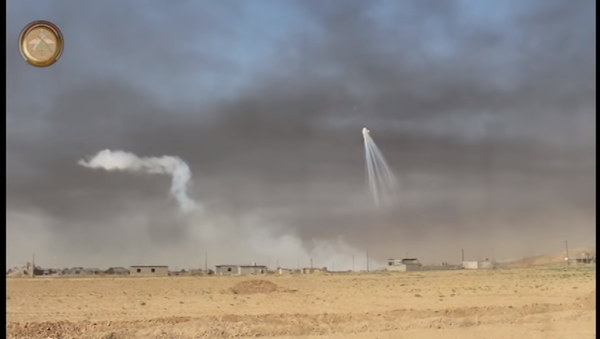Troubling video issued by the Iraqi Defense Ministry show the country's air force dropping incendiary munitions from an airplane on the villages of South Qayyarah as part of the campaign to liberate the territory from the control of Daesh terrorists.
Initial reports from on the ground freelance reporters indicate that the munitions were dropped by either the Iraqi Air Force or by the US-led Joint Task Force for Operation Inherent Resolve planes although the former seems more likely with video footage appearing on the Iraqi Defense Ministry's YouTube page.
Aldin Abazović (@Ald_Aba) August 13, 2016
The town, only 35 miles (56km) from Mosul, has long been a Daesh stronghold until recently when Iraqi forces have made major gains against the Jihadists taking back the strategic Qayyarah Air Force Base in July. Once a booming oil town, Qayyarah has become the epicenter of some of the most violent fights against the Daesh jihadists serving as a critical staging point for the offensive to retake Mosul.
Conflict News (@Conflicts) August 13, 2016
Freelance combat reporters Aldin Abazović said that the incendiary munitions appear consistent with white phosphorus. The use of white phosphorus is prohibited under international law and is considered a war crime if dropped from an warplane into an inhabited area.
Protocol III of the UN Convention on Certain Conventional Weapons defines an incendiary weapon as any weapon or munition which is primarily designed to set fire to objects or to cause burn injury to persons through the action of flame, heat, or combination thereof, produced by a chemical reaction of a substance delivered on the target. These are distinguished from more benign weapons that have secondary incendiary properties such as tracers. The video shows the use of the alleged incendiary weapons at 1:50.
Additionally, even a village overwrought by Daesh jihadists would still be considered to fit within the protocol's "concentration of civilians" definition which extends to any reasonable number of non-combatants including even "a group of nomads." It has been argued by the United States under the Bush administration that these conventions lack full weight because the enemy is not fighting in accordance with international law, but scholars contest that the protections are for the civilians, not the combatants, thus defeating that argument.
Both the United States and Iraq are signatories to protocol III of the Convention Against the Use of Certain Conventional Weapons and are bound against using these weapons in the field of fight by force of treaty and by censure of the United Nations.


